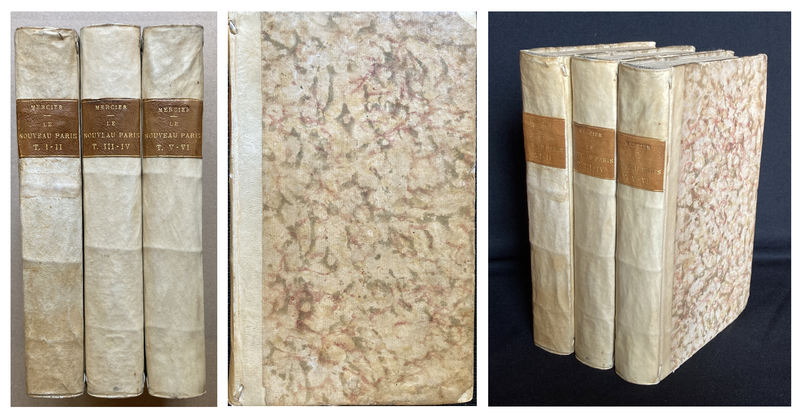Le Nouveau Paris

MERCIER (Louis-Sébastien).
Le Nouveau Paris.
A Paris, Chez Fuchs, Pougens et Cramer, S.d. [1799].
6 parts in 3 vols. (21 x 12 cm). 8°: [2], XXXVIII, 220 pp. ; [2], 254 pp. ; [2], 248 pp. ; [2], 256 pp. ; [2], 256 pp.; [2], 252 pp. Contemporary half parchment spine and corners over paste-paper covered thin boards, smooth spine, with title labels in red morocco and gilt, untrimmed, some occasional browning, as usual, otherwise a near fine and lovely copy. The First edition, with the date “10 Frimaire An VII” at the end of the preface.
Description: Le Nouveau Paris 1799
Composed of short independent chapters of first-hand anecdotes, portraits, reflections, short stories, describing Paris during the French Revolution, 1789-1799. The six volumes of Le Nouveau Paris constitute a sequel to the twelve volumes of Le Tableau de Paris, published by Mercier 1782-1788.
A companion piece to Mercier’s popular previous work, the present work is “much more a political text than a work of [straightforward] observation.” The structure between the two works is similar, both rely on Mercier’s astute observations: entries, anecdotes, portraits, reflections, etc., presented similar to entries in an encyclopedia. As Lacombe rightly observes, Mercier’s descriptions are at times “full of the phraseology and bombast of the time,” but the particularity “does not prevent this book from being very interesting for those who know how to consult it.” (Lacombe 388).
Mercier: keen social critic & neologist: a new language for a new reality
As seen in Mercier’s Néologie (1801), which is not a dictionary so much as it is a model of word-making as an act of creation, Le Nouveau Paris too is exceptionally concerned with the manner in which language determines the force of reality. The following entries are illustrative: [the bookseller’s translation in italics]
“Capitaliste: a word barely known under the ancient régime, a monster of fortune with a heart of stone who loves only metal…”;
“Citoyen actif: according to a decree by the national assembly, one must be an active Citizen, that is, own property in order to vote, a requirement that would have excluded Socrates, Corneille, and J.J. Rousseau were they living. We see that the adjective [active] kills the substantive [citizen]. The true active citizen are those who took the Bastille, those who took the Tuileries… ” ; and,
“Contre-révolution: A new word which appeared immediately after that of revolution. Which signifies the coup de main which, if it were possible, would raise from the ashes the last of our tyrants, a phoenix, who is called the King, or, a phoenix…. Reader, warn me! ” (Vol. 3, pp. 245-246).




